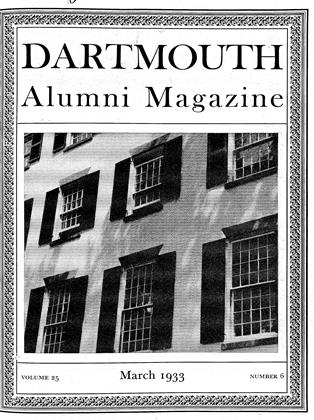IN NO SPIRIT of entering a popular controversy does the MAGAZINE present in- this issue Mr. Dankert's paper on "Economic Aspects of Mechanical Progress." The author has therein adapted his very similar treatment given the subject at a meeting of the Social Science Club of the faculty some weeks ago. His purpose at that time was not to discuss the fine points of technocracy; nor is such his present purpose, nor ours. Mr. Dankert presents his views as an economist on a subject always of interest: his able thinking and expression of academic (and practical) opinion have a flavor of permanency that cannot be influenced by newisms of the day or scare headlines of the hour.
The present economic situation and its host of problems invite examination by those who can direct their own thinking to the end of surveying large areas of progress and growth with a clear eye and steady hand. With someone thus equipped to point out the pitfalls of loose thinking and to set down what factors, in their historical and contemporary significance, are really involved, the haze begins to clear. Perhaps we are already sufficiently enlightened to avoid going "technocrazy" as the punsters predict. But the wave of half panic that followed in the wake of the ill-advised publicity of the energy survey makers leads one to doubt. Certainly there are few college men to whom a review of economics and a recital of accepted facts may not be an attractive and necessary prelude to discussions of the present and future effects of the machine upon society. Mr. Dankert gives us the fore- word and certain conclusions of his own to bring into focus the several points of the problem.
In the course of the past year readers of the MAGAZINE have been given three thoughtful contributions to economics of the day. The first was Professor Ames' "Progress and Properity: A suggested Program"—a proposal that has gone through several editions of reprints since its publication as a supplement to the January issue. The second, "From War to Depression," by Professor Knight, was published in the March number. Mr. Dankert's article is the third in a distinguished series.
 View Full Issue
View Full Issue
More From This Issue
-
 Article
ArticleEconomic Aspects of Mechanical Progress
March 1933 By C. E. Dankert -
 Class Notes
Class NotesClass of 1930
March 1933 By Albert I. Dickerson -
 Article
ArticleHANOVER BROWSING
March 1933 By Rees Higgs Bowen -
 Article
ArticleTHE YOUNG MAN IN POLITICS
March 1933 By George H. Moses '90 -
 Class Notes
Class NotesClass of 1910
March 1933 By Harold P. Hinman -
 Class Notes
Class NotesClass of 1911
March 1933 By Prof. Nathaniel G. Burleigh







